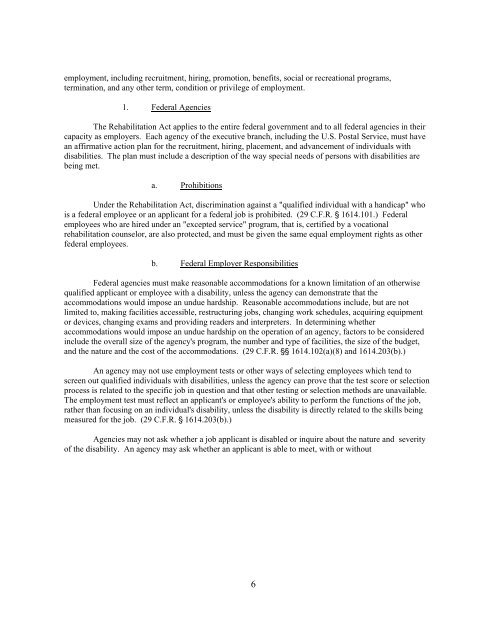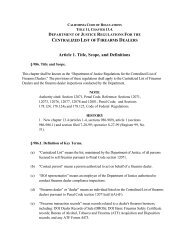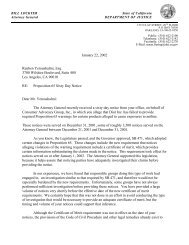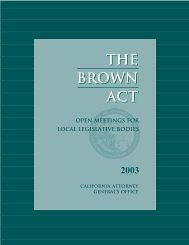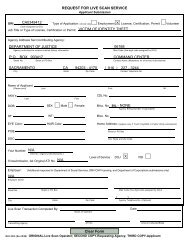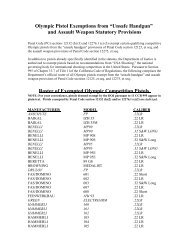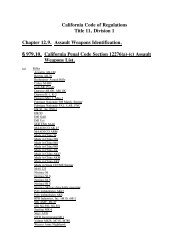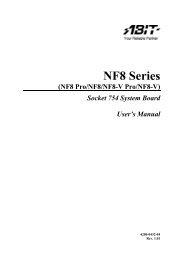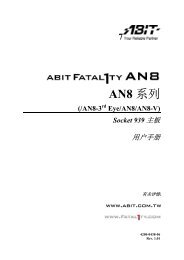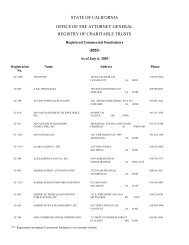Legal Rights of Persons With Disabilities - Ossh.com
Legal Rights of Persons With Disabilities - Ossh.com
Legal Rights of Persons With Disabilities - Ossh.com
You also want an ePaper? Increase the reach of your titles
YUMPU automatically turns print PDFs into web optimized ePapers that Google loves.
employment, including recruitment, hiring, promotion, benefits, social or recreational programs,<br />
termination, and any other term, condition or privilege <strong>of</strong> employment.<br />
1. Federal Agencies<br />
The Rehabilitation Act applies to the entire federal government and to all federal agencies in their<br />
capacity as employers. Each agency <strong>of</strong> the executive branch, including the U.S. Postal Service, must have<br />
an affirmative action plan for the recruitment, hiring, placement, and advancement <strong>of</strong> individuals with<br />
disabilities. The plan must include a description <strong>of</strong> the way special needs <strong>of</strong> persons with disabilities are<br />
being met.<br />
a. Prohibitions<br />
Under the Rehabilitation Act, discrimination against a "qualified individual with a handicap" who<br />
is a federal employee or an applicant for a federal job is prohibited. (29 C.F.R. ' 1614.101.) Federal<br />
employees who are hired under an "excepted service" program, that is, certified by a vocational<br />
rehabilitation counselor, are also protected, and must be given the same equal employment rights as other<br />
federal employees.<br />
b. Federal Employer Responsibilities<br />
Federal agencies must make reasonable ac<strong>com</strong>modations for a known limitation <strong>of</strong> an otherwise<br />
qualified applicant or employee with a disability, unless the agency can demonstrate that the<br />
ac<strong>com</strong>modations would impose an undue hardship. Reasonable ac<strong>com</strong>modations include, but are not<br />
limited to, making facilities accessible, restructuring jobs, changing work schedules, acquiring equipment<br />
or devices, changing exams and providing readers and interpreters. In determining whether<br />
ac<strong>com</strong>modations would impose an undue hardship on the operation <strong>of</strong> an agency, factors to be considered<br />
include the overall size <strong>of</strong> the agency's program, the number and type <strong>of</strong> facilities, the size <strong>of</strong> the budget,<br />
and the nature and the cost <strong>of</strong> the ac<strong>com</strong>modations. (29 C.F.R. '' 1614.102(a)(8) and 1614.203(b).)<br />
An agency may not use employment tests or other ways <strong>of</strong> selecting employees which tend to<br />
screen out qualified individuals with disabilities, unless the agency can prove that the test score or selection<br />
process is related to the specific job in question and that other testing or selection methods are unavailable.<br />
The employment test must reflect an applicant's or employee's ability to perform the functions <strong>of</strong> the job,<br />
rather than focusing on an individual's disability, unless the disability is directly related to the skills being<br />
measured for the job. (29 C.F.R. ' 1614.203(b).)<br />
Agencies may not ask whether a job applicant is disabled or inquire about the nature and severity<br />
<strong>of</strong> the disability. An agency may ask whether an applicant is able to meet, with or without<br />
6


